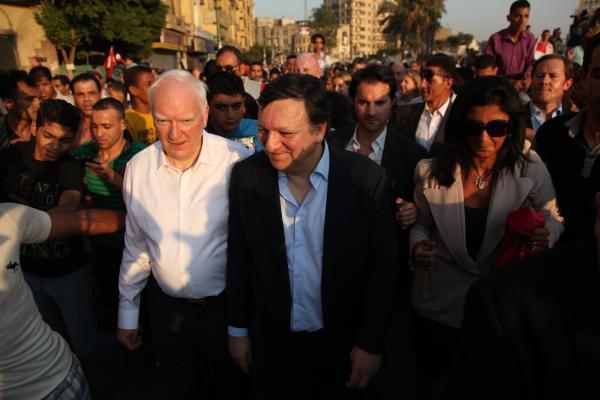
From left to right, EIB President, Philippe Maystadt and Commission President, José Manuel Barroso crossing the Tahrir Place.
Supporting sustainable growth and jobs in the Southern Mediterranean countries in transition is a priority for both the European Commission and the EIB. Demonstrating this coordinated response to the Arab Spring, Commission President Barroso, EIB President Maystadt, and EIB Vice-President Philippe de Fontaine Vive responsible for operations in the region, travelled to Cairo on 13 July to meet with Egyptian top officials, including Prime Minister Essam Sharaf. Meeting with political as well as civil society representatives, the joint delegation came to listen and respond to the needs identified with practical and effective action.
The EIB is already the lead international financier in the Mediterranean, supplying more than half of Europe’s financial contribution and more loans than all other international financial institutions combined. Last year only, the Bank invested a record 2.6 billion euro in countries under the Facility for Euro-Mediterranean Investment and Partnership (FEMIP), which covers Algeria, Egypt, Gaza/West Bank, Israel, Jordan, Lebanon, Morocco, Syria and Tunisia. Total lending since 2002 has reached some 12 billion euro. About half of the financing went to the private sector, which is a priority alongside the creation of an investment friendly environment in the region. This helped to support some 2 150 SME’s, which created more than 30 000 jobs.
Focus on sustainable growth and jobs for the region
Speaking at a ministerial meeting in Brussels ahead of the Egypt visit, EIB President Maystadt emphasised the crucial role that the economic situation plays in the democratic development of the Mediterranean: “What triggered the regime-changing events in the region? Widespread protests over mass unemployment, in particular among young people. We therefore need to help change the business climate and create hope for the jobless, many of whom now risk their lives in trying to reach the shore of Europe in search of work.”
As part of the response to the unfolding events in the region, G8 leaders in May agreed to mobilise additional funds at their annual meeting in the French seaside resort of Deauville. International financial institutions are to provide some 14 billion euro by 2013, with 3.5 billion euro earmarked as loans from the EIB in Egypt and Tunisia. In Tunisia, EIB Vice-President Philippe de Fontaine Vive has already signed two post-Deauville loans worth some 300 million euro on behalf of the Bank to support job creation and industrial development.
“The Bank is the biggest development lender in North Africa. Already there are nine Egyptian projects in the pipeline for the coming 12 months, worth well over one billion euro,” Barroso said. “The EIB will look into sectors which are in line with the priorities of the new government,” Vice-President de Fontaine Vive further explained. The EIB will look at financing priority areas, such as the energy sector, housing, infrastructure and small enterprises. The Bank also intends to launch a 100 million euro pilot phase as soon as December this year to support the development of the economy. This programme would be co-funded by the Egyptian government and with EU grants alongside EIB loans, thereby joining up forces to support the country at this crucial moment.